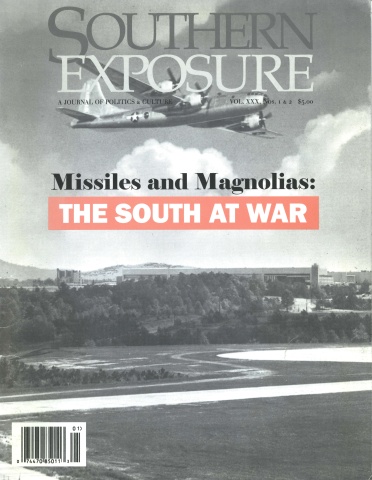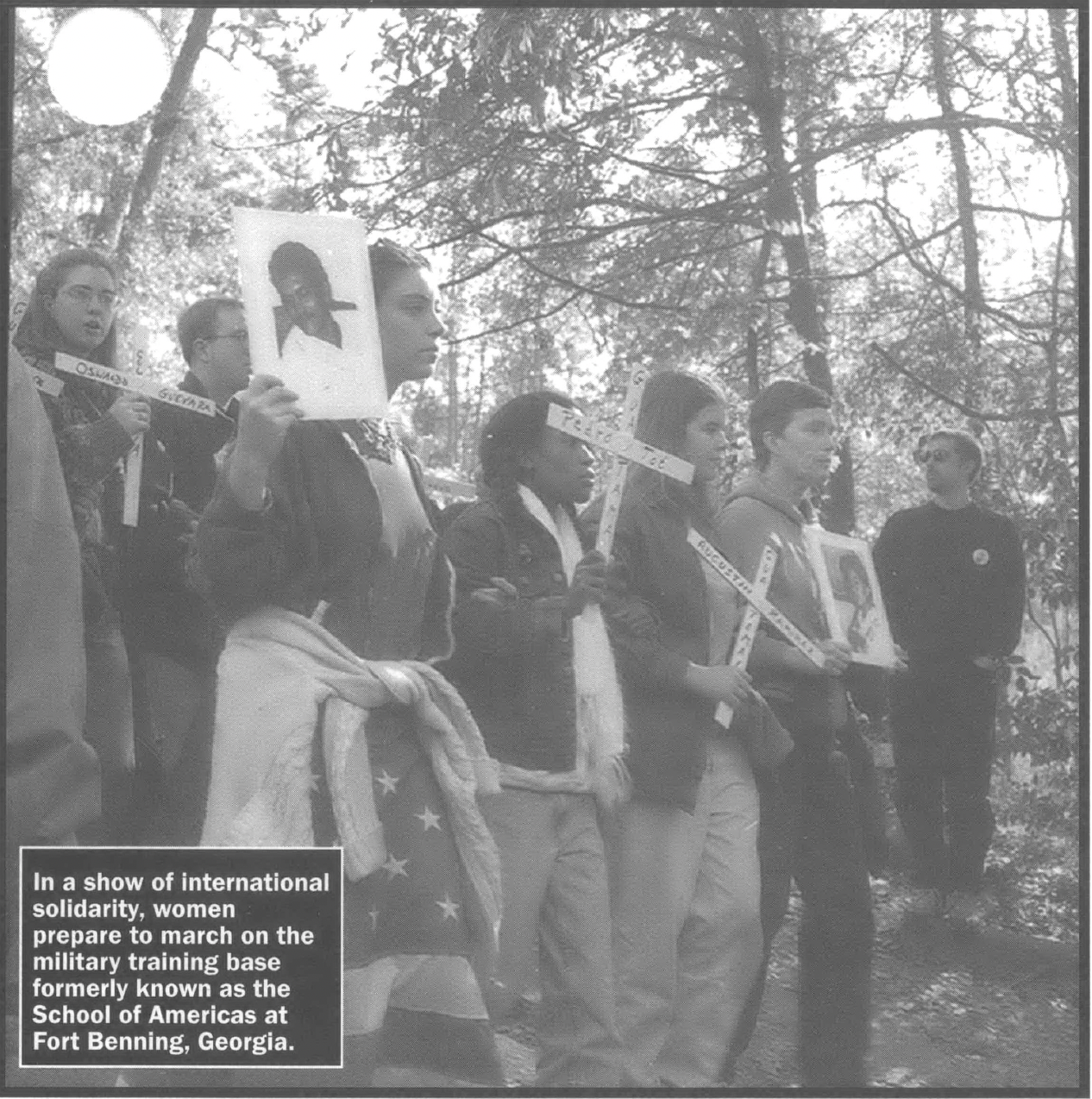
This article originally appeared in Southern Exposure Vol. 30 No. 1/2, "Missiles and Magnolias: The South at War." Find more from that issue here.
February 16: Agence France Presse reports, “Israeli tanks staged four incursions in the Gaza Strip overnight, moving into the Al-Maghazi refugee camp for the third time this week, destroying the military intelligence headquarters in the autonomous village of Hai Al-Zeitun and invading the village of Juhu Al-Dik and the refugee camp of El-Bureij. Three Palestinians were killed and 15 injured in El-Bureij.”
February 17: John Donnelly and Anthony Shadid of the Boston Globe write: “Bad intelligence, errant bombs, and the changing nature of the war in Afghanistan have led to the deaths of a thousand or more civilians in U.S. attacks since October.”
February 19: The Associated Press reports, “Eight Palestinians, including a 14-year-old girl and three other civilians, were killed Tuesday. . . . In one strike, Israeli helicopter gunships fired three missiles . . . in the crowded Jebalya refugee camp, killing two Palestinians and critically wounding four, including a 10-year-old girl, doctors said.”
February 19: Julian Borger and Ewen Macaskill of Daily Mail & Guardian write: “The Pentagon and the CIA have begun preparations for [a more prolonged military] assault on Iraq involving up to 200,000 United States troops.”
News of the day. And there is more, much more. Is it just another day?
I read the news alone, and feel restless, overpowered, guilty for not speaking out loud enough, angry at the mindless murders and insanity (yes, insanity, what else can these policies be but pure insanity when there is enough for us all?). I read the news, and sometimes the pain is so overwhelming that my feelings go numb and the news becomes merely letters on a page, pictures on a TV screen, routine. And I feel scared, for isn’t it scary for the soul to read the horrors taking place as merely routine, and to close the newspaper to watch the latest episode of a TV show?
Today is another day, yes. But I remember a day not so long ago.
There we were. Thousands of strangers, united by a common vision, walking as camaradas. Thousands of people, marching for a new world, united in the belief that another world is possible. Thousands of people, from vastly different — and yet very similar — places, from Nepal, Mali, Palestine, France, Uruguay, Argentina, indigenous communities of Latin America, and, yes, the United States, all marching in Porto Alegre, at the World Social Forum in Brazil. There we were, marching amidst the music of our different languages, the Palestinian delegation chanting in Spanish with the Argentines, and all together chanting in Portuguese “Viva Palestina livre!” The sky of Porto Alegre was filled with our flags, and we felt that each flag was our own, and that all the flags, together, represented our vision.
All of us. Together.
I am not alone, although reading the news — as presented by the mainstream press —from the solitude of my room, leads me to feel enclosed in an isolated and lonely bubble. I am not alone, but linked to advocates for justice.
I am not only linked to the thousands of beautiful activists (approximately 52,000) who came to the World Social Forum, but also to all those they represent, the hundreds of thousands, the millions of people in communities struggling to live, believing that another world is possible. And they, in turn, are linked to each other and to us. That is our globalization, the globalization we believe in, the globalization that we have created, and that we need to empower, and enrich, and understand.
It is our responsibility, those of us who believe in the possibility of a just world, to examine and articulate the specific globalization-related components of whatever issue on which we are concentrating our efforts. How are the struggles for a livable wage for workers in the South, voting rights for African-American communities, civil rights for all people living in the United States, and the struggle to de-militarize our economy and our lives linked — and how are these struggles linked to the struggle to liberate Palestinians from 54 years of oppression and apartheid, and to liberate Iraqis from the 11-year siege of economic sanctions and bombings?
We are working on global issues when we are working to end the “War on Drugs” or the “War on Crime” or the “War on Terrorism” — all of which are wars against the poor and the oppressed, all of which are wars to maintain the power of the militarized corporations (what else do you call corporations whose power is backed by military expenditures or actions?).
I believe our road to justice can only be achieved if we walk the road together, and when we walk together, the loneliness and despair collapse. I believe in what a well-known advocate for equality stated:
Because lack of freedom makes us the same
Because we are united in the racism we suffer within and across borders
Because the war they impose on us makes us companeros and companeras
Because we no longer want this kind of world
Because we no longer want crime celebrated
Because we no longer want falsehood treated as a virtue
Because we no longer want others to impose their forms of being and thinking on us
We want to be free
And the only way to be free is to be so together.
This is why we want to be free and in solidarity . . .
We won’t remain silent
We’ll stand fast
We’ll struggle
We’ll build another world
A better one
Bigger
Better
One in which all worlds can fit.
These are the words of Subcomandante Marcos, who are fighting for their basic rights in Chiapas, in southern Mexico.
And when we recognize how our many issues are linked, and recognize the intrinsic need to understand these linkages, as Marcos explained, then we will be strengthening our movements for peace and overcoming the injustices we face. And we will be fulfilling what another famous advocate for peace urged us to do decades ago. “Those who love peace,” said the Rev. Dr. Martin Luther King Jr., “must learn to organize as effectively as those who love war.”
And the core of organizing is communication — speaking to people in our communities, and listening to them as well. Before I strive to change the perspective of those who are openly for war, I need to talk to those who are being oppressed by the wars. I believe that peace-work begins with the people themselves, with the empowerment of communities through information and hope.
Yes, and hope.
I must believe that another world is possible if I am to struggle and to empower others to struggle to change this world. I must believe, truly believe, that there will be justice, and not merely be acting out of desperation, out of a gnawing need to ease my conscience.
This is difficult for me, at times. At times, I am not so sure, so sure if we can really win this struggle, all our struggles. There are those days, and that is when I remind myself of our histories. Yes, although our histories are filled with stories of power-hungry men (and some women) committing mass murder for economic profit, our histories are also filled with stories of women and men whose hearts were so filled with love that they committed themselves to work for justice — to work for the eight-hour work day, the abolition of slavery, the woman’s right to vote — and, more recently, the women and men who struggled against the privatization of their water in Bolivia and won last summer! And the women and men who took to the streets in Argentina to reclaim their economic livelihood — and succeeded in raising their voices loud enough to challenge the religion of free market rule across the hemisphere.
And the millions of women and men who are struggling to remain — to remain on their lands, in their homes, on their farms, so long as they are struggling, they are winning.
I must believe that another world is possible. And I do. I believe it because we have no choice. I believe it because tyrants cannot rule for ever. They have always fallen. Always.
And, I must remind myself of another task, one that may be even more difficult. In this struggle for justice, in our struggles for peace, may I be at peace, with myself.
It is the words of yet another beautiful advocate for peace that reminds me of this task (how empowering it is that there are so many beautiful advocates for peace!). Eduardo Galeano writes of the importance of joy:
I pursue the enemy voice that has ordered me to be sad. At times I feel that joy is a crime of high treason, and I am guilty of the privilege of being alive and free.
Then it helps me to remember what Chief Huillca said in Peru, speaking before the ruins. “They came here. They even smashed the rocks. They wanted to make us disappear.
But they have not been able to, because we are alive, and that is the main thing.” And I think that Huillca was right.
To be alive: a small victory.
To be alive, that is: to be capable of joy, despite the good-byes and the crimes, so that exile will be a testimony to another, possible country.
The task ahead — building our country — cannot be accomplished with bricks of shit. Will we be of any use if, when we return, we are broken?
Joy takes more courage than grief. In the end, we are accustomed to grief.
To be alive and to be capable of joy, despite the horrors that we feel, yes, that is the real victory. And that is the core of a revolutionary spirit.
The joy. The hope. The simple and most beautiful truth of equality. The many webs that tie the struggles together, so that they all become one global struggle. Together, this other world will be possible.
Tags
Rania Masri
Rania Masri directs the Institute for Southern Studies’ Southern Peace Research and Education Center and codirects the Campaign to Stop the War Profiteers and End the Corporate Invasion of Iraq. (2003)

